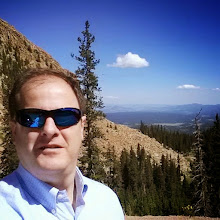Pictures of Global Warming? You Be the Judge, but the Jury is Clearly Out.
American photographer Gary Braasch has been documenting images of environmental change since 1999. This webpage at the BBC's website has some examples of his work.
Braasch makes the claim that his photo comparisons are documentation of global warming. Maybe. But I have the following questions. Follow the pictures at this link as my questions follow their order in the BBC presentation.
- Do reductions in glaciers show evidence of current environmental damage or the lagging effects of a previous Ice Age tens of thousands of years ago?
- Is soil erosion really that much different now than any previous era of this planet's geological history?
- It seems to me that snowfall varies from year to year.
- It seems to me also that bugs have been moving around the planet for some time now, but maybe I misunderstood the memo.
Until sufficient answers are given, the photos are at best interesting comparisons of geophysical change and at worst mere anecdotal "evidence" of man's destruction of nature intended to support the socialist agenda most environmental organizations propose governments adopt.
UPDATE: MaxedOutMamma has expanded upon this post. She went out and found some actual research (here) on the Upsala glacier in the picture and surrounding ones. It turns out that in the same area, certain glaciers expanded at the same time the Upsala glacier was reduced. She explains below:
I don't want to be pedantic about this, but when the temperature is falling, conditions can cause a glacier to retreat, and when the temperature is rising conditions can cause a glacier to advance. All glacial boundaries are marked by a melt/replenish cycle (ablation/flow). If a lot of precipitation (snow) is falling on the glaciers core, the glacier's boundaries may rapidly advance during a time of rising temperatures. If precipation on the glacier's core is low, the glacier may retreat during a time when of falling temperatures.Here's the link she found to the research.
. . .Which brings me to a personal anecdote:
When I was young, I wondered why my mother questioned doctors so much. You should have seen how she treated them if they recommended something that worried her. She'd get in their face if she had to to figure out why they recommended a certain treatment that seemed inappropriate. And sometimes the doctor would change the them on her advice!
When I asked her to explain this, she told me that she became very suspicious of doctors after attending nursing school in the 1950's. Though there were doctors she liked during that experience, she came away with the impression that most trained physicians and surgeons considered themselves equal with God. They were little demi-gods ruling their kingdoms tyranically abusing those who questioned their ability or "professional qualifications." And when it came to the treatment of the children she loved, she wasn't having any of that! "They're humans who make mistakes like the rest of us!" she would say.
We would do well to take my mother's approach with scientists.
N.E. Republican links this story here.










<< Home